Dad would have turned 79 today. I miss you, dad.
I’m often asked why I do this. Why did I start this website? Why do I invest so much time in it? Why is the Basque thing so important to me? For a long time, I didn’t really have a good answer. Maybe because it’s cool? I mean, being Basque is sort of like being part of a special club. A mysterious origin lost to the mists of time. A strange and unique language that even the devil struggled to learn. Long and unprounouncable last names that are full of k’s and tx’s. A people who have been besieged from all sides but somehow managed to maintain their identity over the centuries. Isn’t all of that cool?
As I dwelled upon it more over the years, though, I realized that wasn’t the real reason I created this page and continue to maintain it. The real reason was my dad.
I can’t claim that I was overly close to my dad. When I was a kid, we never played catch or kicked a ball. We never talked about girls – he never had any advice for me regarding romance. We never hung out, just the two of us. We never talked about my future, about what I wanted to be when I grew up. I don’t think dad ever really appreciated what going to graduate school and studying physics really meant, where it might lead me. He was just a little flabbergasted that anyone would choose to go to school that long. And the only real advice he ever gave me was to work inside, with an air conditioner, not outside in the hot sun like a jackass like he did.
When we were kids, my brothers and I would often go out with dad on his hay runs. He would get one of us up at some ungodly hour – sometimes as early as 3 or 4 in the morning – since he wanted to be at the haystack by dawn to begin loading the truck. I didn’t like getting up that early, but it was one of the few times it was just me and dad. It was the only time we got to sort of hang out together. We didn’t talk much, but we would stop at some convenience store, grab a few sodas and sandwiches. At the haystack, I would help straighten loose bails or tie up the ropes when he was done. It wasn’t much, but it was time, just me and dad.
It took me a while to understand that there was this gulf between me and my dad that was almost insurmountable. We came from different cultures, from different worlds. Growing up in the United States, I was part of a collective experience with my friends and neighbors. We all studied the American Revolution and the Civil War in school. We all knew the rules to football and baseball. We all got excited about the next episode of Knight Rider or The Greatest American Hero (ok, maybe that was just me). But, my dad didn’t have any of that. He couldn’t care less about American football. His sport was boxing. And while he did get into some TV shows – Little House on the Praire or Walker, Texas Ranger – these weren’t the exciting new shows that me and my friends watched. And he didn’t really know much about US history.
And what he did know – Euskara, the folksongs of Bizkaia, the history of Goikoetxebarri, the baserri he was born in – he never really shared and so it was foreign to me. When I was a kid, dad worked and tended his garden – he didn’t really have any hobbies. When I was older, after I left for college, dad started making jamón and chorizos – things that came from his upbringing – but by then I was off doing my own thing and I never really got to learn how to do those things from him.
My dad came from a very different cultural context, one that I knew next to nothing about. In the first thirty years he lived in the United States, he went back to the Basque Country maybe twice. And he couldn’t afford to take us.
When I was in college, studying physics at the University of Idaho, I decided to go to the Basque Country myself and learn Euskara. My dad asked me why. Why learn Euskara? Spanish was so much more useful, you could speak it in so many more places. I tried to explain that I wanted to learn Euskara because it was his language, that I wanted to learn more about his culture. I think he understood, but if he did, he never really said so. But, even more than learning some of his language and culture, I got to meet his family, I got to meet the aunts and uncles I never knew, I even got to meet my amuma for the first time. I stayed in the baserri – Goikoetxebarri – where he grew up. I started getting to know something about where dad came from.
After I got back and started grad school at the University of Washington, I decided what I had learned about the Basque language, culture, and people was cool, and I wanted to share it, so I created this page. I quickly made a lot of new friends, people in the Basque Country who were eager to share their culture with the rest of the world. And it was a way for me to build even stronger connections to the Basque Country, to learn something beyond the things I could read in the admittedly few books I could find in English, most of which focused on history or the pastoral life of the Basque sheepherder in America. None of those books talked about the Basque Country as it is today. I learned about bands like Negu Gorriak and Su Ta Gar. I learned about the unique policies of Athletic Bilbao. I saw the Guggenheim. I learned about the complex political history of the Basques. And I learned about the land my dad came from.
Ironically, I learned about a Basque Country that my dad didn’t really know. Much had changed in the decades since he left the Basque Country. The music was different. The language itself was different. While the baserri was still an important part of Basque cultural identity, the direct connections to it were different, more remote. Just as many baserri had become luxury dwellings as they were the ancient centers of family that my dad grew up in. Once, when we were all driving somewhere in dad’s big pickup truck, I had him pop in a cassette of Negu Gorriak. Normally, he just ignored the loud noise that I played from the speakers, but this time, he understood some of the lyrics. And it was the first time he said something like “What the hell is this?”
Even though the Basque Country I got to know had changed a lot from the Basque Country my dad grew up in, it still gave me a touch stone. More importantly, I got to know some of the names of the people he grew up with. The names of the other baserriak and barrios. I slowly began to recognize the names and places he would throw out in the stories he started telling. And when I took him to the Basque Country, just him and me, I was able to start putting things together.
Back in 1997, my dad had a heart transplant. We were lucky that Washington has a great med school and I was living in Seattle, getting my PhD, so mom and dad could live with me for a time. And, after dad’s surgery, he still had to come back up for appointments, and he would crash with me. I didn’t really take advantage of having dad around as much as I should have, but I was still able to spend time with him, often in the kitchen, as he started cooking more and hanging out with some of the Basque friends I had made. We weren’t playing catch or anything like that, but we finally got some time to just hang out.
On one drive, up from Nevada back to Idaho, I got my dad (at the suggestion of my wife Lisa) to start talking about his childhood. And I recorded it. He would throw out names of people, baserri, and towns as if I should know them all, and I was pleasantly surprised that I did know at least some of them. I knew who this lady was, or where that town was. A lot of names still escaped me, but I knew a lot more than I would have guessed. And I could ask him questions about these people and places, at least some of them, because I knew who and what they were.
In the end, this page and all of the things I’ve learned over the years working on it, all of the people I’ve gotten to know through it, all gave me some connection to my dad that I would never have had otherwise. I like to pretend that I got to know him a little better by getting to know the Basque Country, that maybe I understand a little more where he came from and the circumstances and culture that made him the man I knew. This page is my way of honoring my dad and keeping him alive.
So, yeah, it’s cool to be Basque, but it’s even cooler getting to know my dad better.
Goian bego, aita. I miss you.
Thanks to Lisa Van De Graaff for encouraging me to record dad and his stories when I could. Lisa took the photo at the top.

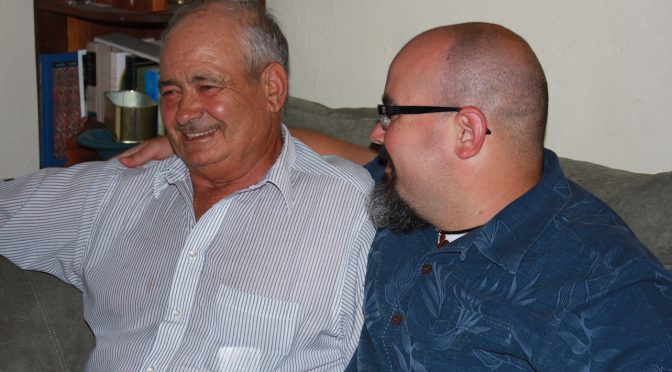
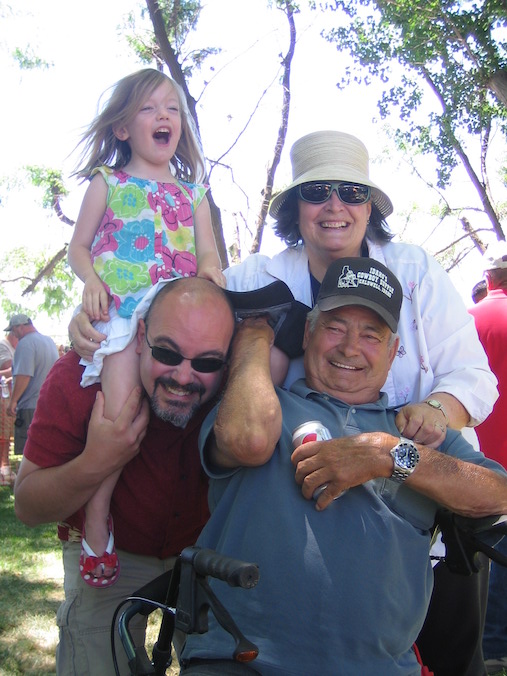
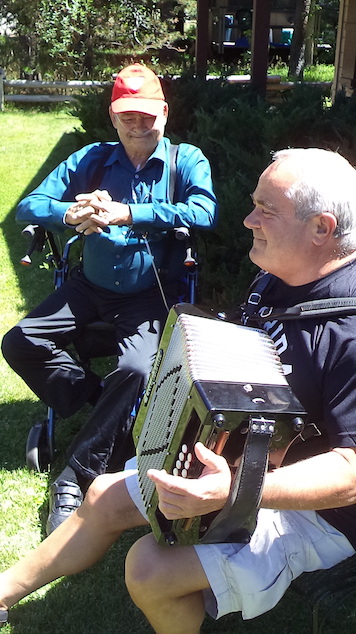
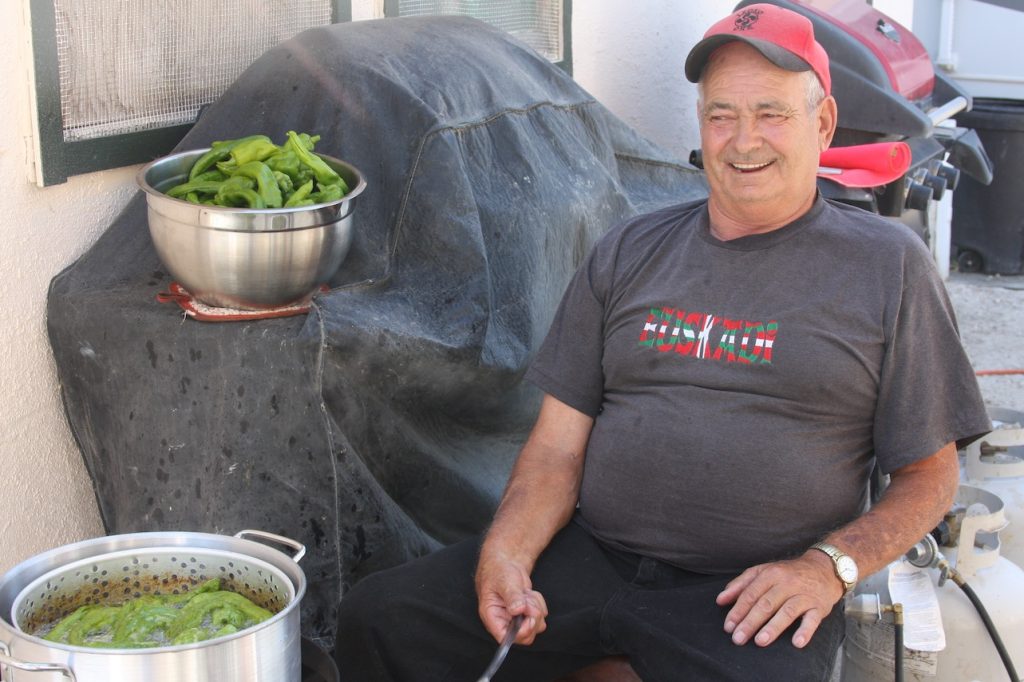
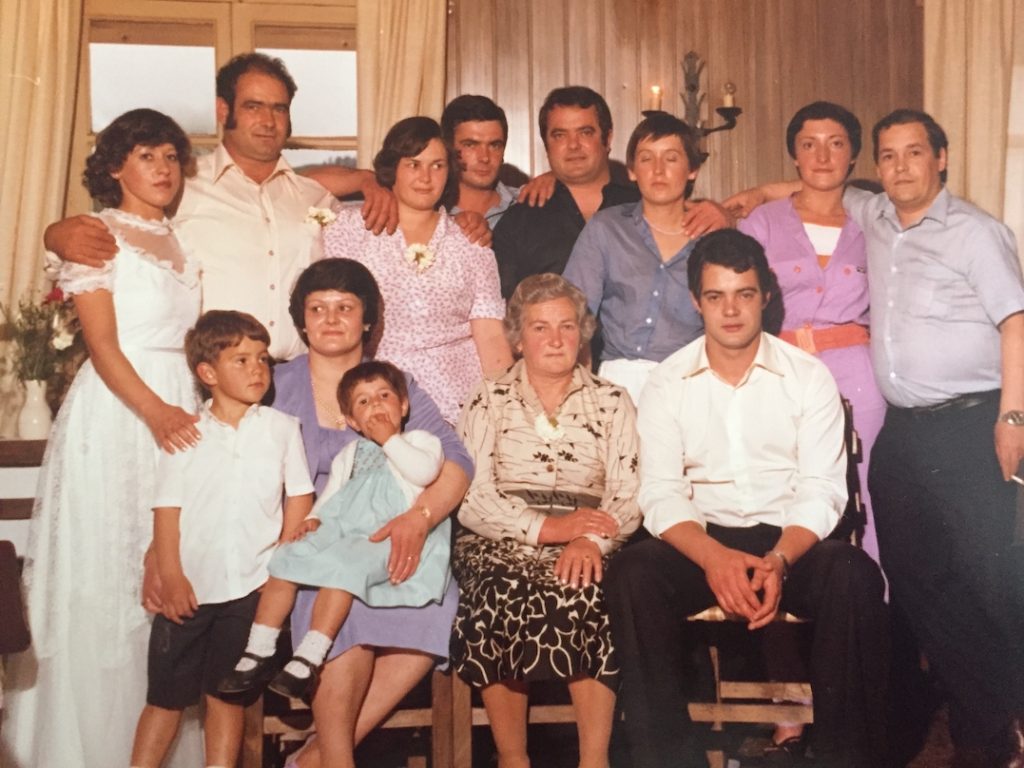
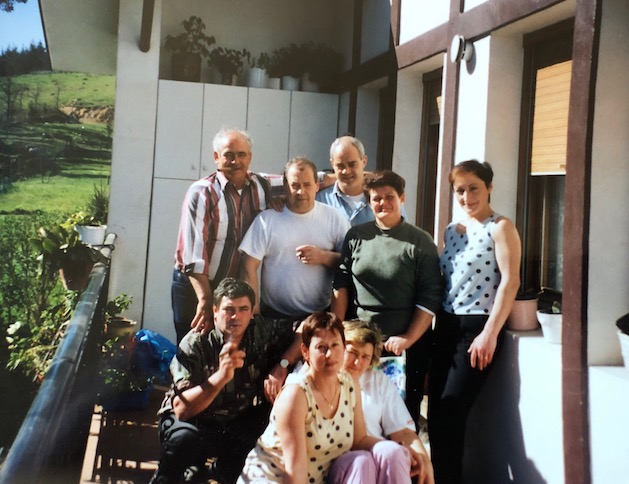
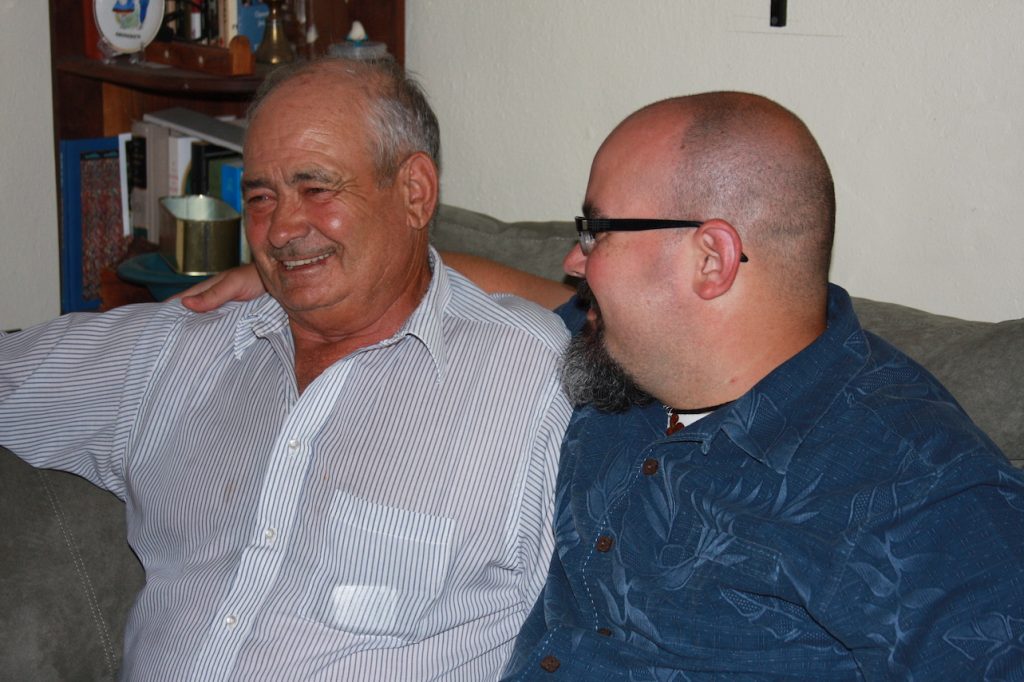

Thank you for sharing this, very inspiring!
Thanks for reading, Gary!
Kaixo Blas!
I miss my dad perhaps as much as you do; however, you are honoring him well.
Iran zirelako gara garelako izango dira.
Ondo izan Joseba
Mil esker, Joseba! I appreciate the kind words.
Love!!!!
Mil esker!
I so look forward to your weekly writing and this on really tugged at my heart. My dad (and his 4 brothers) came from Aldudes and settled here in mid-California. So much of what you experienced with your dad I had too. He didn’t talk much on a personal note when I was growing up, just knew the love and hard work, as yes Dad would wake us up at some godly early hour to truck the sheep, move the sheep on roads in summer… Thank that wonderful wife for recording your dad and his stories! I wished I had done that for names and stories, but most of all HIS VOICE! Miss you Aita!!
Thank you Michelle! I’m glad you enjoy the site. I do think that my experiences are probably very common for children of immigrants. Not all, but I suspect many. And, yes, I was very lucky to have Lisa push me record things, even when dad told me to turn that damn thing off. 🙂
That’s a beautiful remembrance of your dad, Blas. Treasure those mindful moments you created with him! Well done.
Jenn
Thanks Jenn! One reason for me to write these down is so I don’t forget myself. 🙂
I love your stories about your aita. We miss him around here. Always being the last ones to plant our garden, I told John last week as we were talking about getting started that I felt Pete on my shoulder telling us to plant. John says, “hell, he’s been here a week telling me that!”
Thanks Gloria! I’m sure he’s looking over you guys, shaking his head that something isn’t right. 🙂 That’s a pretty cool story!
Eskerrik asko hitz eder horiek partekatzeagatik.
Ez horregatik! 🙂
Sam, what does it mean? Monique
Goian Bego, Pete! I think he’d be so proud that this page and the community you’ve created around it is in part to honor him. What a fabulous legacy!
Thanks Lael! 🙂
What a great tribute to your dad. So reminiscent of my “tight-lipped father and grandparents and it has taken a lifetime to connect to my family and history in the Basque Country. Thank you!
Thanks Valerie. I expect that many immigrant kids had similar experiences.
Thanks Buber,you make my day ,I love it well done …gracias hermano Gora Euskadi……………
Mil esker Alfonso!
Thank you very much for descriptions and experiences. I had a very similar experiences with my dad. It seems it is a Basque thing!
Or common to kids of immigrants. I don’t know if it matters where they are from, there will always be this gulf between the old and new culture, I think.
Greetings,
It is not Basque or immigrant. I was the archivist of a sound recordings archives for many years. At least once a month, I would receive a call from someone looking for a recording or information about their relatives–it was routine for all the archivists.
Hearing the voice of a relative had more impact on a person(s).I don’t know if you ever saw the big reel like in some old movie—it is what I had to work with. I would make a tape for them to listen to with headphone –it was in a public area. Often, they would be so emotional, that I would invite them to my office so that they could cry in privacy. Left them alone and returned after a while.
When I returned to the office, we would listen to the tape, I would ask questions to fill in gaps. Then we would walk to visit with the photo and manuscripts archivist to check for more info. If so and it was not too much material, we would make copies gratis. They would leave happy taxpayers. So folks, keep records of your family history –your children and grand children will thank you.
Monique
To all of you who had the same experience–it may be a comfort or not, but you need to know that your father or mother loved you even though they did not express it the way you would have liked or hoped.
You were raised and molded by a different culture than you parents experienced. You expected your parents to be like your friend’s parents. Your parents could not be like your friends’ parents. Does it mean that they loved you less? of course not.
Ask yourself? were you uneasy because your parents were different? did not speak English well or did they speak English with an accent? did you hear comments about the Basque that were insulting? did you associate such comments to your parents?
I have two daughters and they tell me the same thing–I am distant, I do not talk about France and Spain. Yet, they lived there for a long time.
Rest assure, your parents loved you. Don’t wait till they have passed on to realize it. Put on another pair of eyes to see life their way.
Monique
Hi Monique, I don’t think anyone is trying to suggest that their parents didn’t love them or anything of the sort. Rather, that developing certain kinds of relationships were simply harder, and I think that is true. We all certainly appreciate all of the hard work our parents have done, all of the sacrifices that they made to give us the lives we have. No one is questioning that.
Yes, it is harder to develop a relationship but as children grow up, they should try to understand their parents. I know that you all appreciate what your parents did for you.–later in life.
Monique
I really enjoyed your story! I too am Basque and wished I had asked my grandparents more about the “old country””. They came through Ellis Island and my mother’s parents came to San Juan Capistrano in 1910…my grandfather helped herd sheep not too far from the mission. They spoke three languages and my brothers and sister would be frustrated when they switched into Euskara (secret language that it is). We were brought up knowing we were Basque and when checking off ethnicity boxes we were told to always check off “other”. My grandfather would sometimes say he missed the different shades of green he remembered in Sumbilla…he never went back. I regret not asking more about there lives in the Pais Vasco. Celeste Zamora Povey, Verdi NV
Thanks Celeste! I do wish I had asked my dad more questions, recorded more of his stories, but too often hindsight is 20/20. We move forward the best we can. Thank you for sharing your story!
Maybe your father did not want to talk about the Basque country he left behind. Some people do not want to live in two worlds because it is too painful. I have known immigrants who want to be Americanized to the max. because it is too painful to remember their home.
You have a kind, intelligent wife–a lovely daughter, you are educated, you have a good job, you have brothers with whom you can share your father’s memory, you have family in the Basque country who love you and are happy to see you, you spend a year in the Basque country, you honor your father very well and I am sure that he is looking down very proud of you, look the joy in your father’s face while speaking with you. What else do you need to move forward?
Monique
I think you misunderstand the point of this post. It isn’t to put blame on my father or anything of the sort. It is based on a desire to know him and where he came from more. Nothing more. I don’t need anything to move forward. I just want to better understand who he was.
To understand the present one needs to know and understand the past. As I read all the posts, they are written by Basque American who have no clue of the life of your father’s generation. Moreover I am an immigrant of your father’s generation. My ancestral home is in the Pyrenees–underline ancestral. All the relatives of my mother and father are from the Pyrenees on both side of the border. At certain time or other, my eyes have seen the same thing your father saw, tasted or smelled the same food your father ate and smelled. And I could go on. The people of the Pyrenees are mi gente, mi gente on both side of the border. I hope you all understand the weight of that word. I go back home every year, except during covid. I have seen the changes from 85 years ago.
I believe and I know why you misunderstood my point. I do not put the blame on anyone. I do not believe that none of you will understand why there is a gulf of no communication. But please, keep on trying, do not give up. Someday you may find YOUR answer. and the answer may surprise you.
I am reading the book, “Boyhood among the woolies: growing up on a Basque sheep ranch” by Richard e Etulain, Chapter 7, Going to Church. I understand why Rick’s father changed religion and it did not surprise me. I did not have to look up why. I wish I could have heard that powerful Basque’s voice singing, off key or not “No, Never Alone.”
Do you all know or heard of the Basque’s cry, or holler–it is the way sheepherders communicate in the darkness of night. by the way the sound resonate they can tell how far or close they are canyon. Do you all know that the sound of bells around the sheep neck are based on 5 notes of the musical scale. Imagine the skill of the metal worker to mold the metal to make a musical note that will harmonize with the other bells. The sheep have their own philharmonic orchestra in the beautiful mountains of the Basque country.
Enough now. Thank you Blas for your reply. Keep searching and good luck to you and your readers.
Monique
When you parents came over, they were alone. In the “old country” there was always an elderly person looking after the children, not physically, the moral gate keeper and the story teller. They knew your parents when they were little. I found out a lot about my father, uncles, aunts–what they did, how do they comported themselves. We knew, more or less ,what to expect as we grow up. We were reminded as children to thank our parents, to be polite. That elderly person had great influence.
When your parents came to America, No one was there to help raise you. It may sound trite, but it takes a village to raise a child.
Monique
I enjoyed reading this story as being Basque I could relate to your every word. I took my Mother to Spain in 1982 to visit her family that she left at a very young age. It was great to meet her sister, brother, nieces & nephews, cousins, etc. We also visited my Father’s foster family in Espaster. We are still in touch with both families. So many wonderful memories!
Thanks for sharing Margaret! It is great to hear you’ve been able to establish a nice relationship with your family from over there!